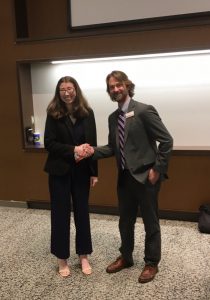
Helen Ruger winning the Beaumont Prize at the 2019 UTK Undergraduate Classics Conference. Photo credit: UTK Classics department.
This month, I spoke with a friend and fellow Classics major about her experiences with the Laidlaw Scholars program. Below is the first part of our conversation, in which we talk about how she was introduced to the program, her experiences with faculty mentorship, and the topic she chose to research in her first summer with the program. (This interview is lightly edited for clarity and length.)
Virginia: How did you hear about the program? Can you sketch out that story for me?
Helen: I found the program on the URF website my freshman year around December when all freshmen were thinking about internships over the summer. I was really interested in research. I had done independent research in high school in Classics. It seemed like such an incredible program. You get to design your own project, and you receive funding for two summers.
When I applied the program was really new—I was a member of the second cohort. But I reached out to students who were in the first cohort, and I heard about the program through Professor Katharina Volk in the Classics department. She had mentioned it to me in office hours.
Virginia: So, from the beginning you knew that you wanted to get involved in research in some way. And I heard you mention a couple of different faculty members. What was your experience with faculty mentorship both before and during the program? Did you have a specific advisor or did you work with a couple different faculty mentors for your research?
Helen: I did two very different projects, so I had two different mentors. My first summer, as I mentioned, I knew Professor Volk through the Classics department as an incoming freshman (she was the DUS at the time). So, I spoke with her about some of my interests and the possibility of her supervising my work. Then, when I applied to the Laidlaw program in January, I already knew that I wanted to work with her, and she had agreed to work with me. We spoke once or twice more before the summer began, but over the summer we communicated at least once a week. The mentorship was really great. I was able to share my thoughts with her and get her advice. She shared with me possible avenues for reading, because at the time I was a very young Classics researcher figuring out where you look for information. And continuing from Summer 2019, she has been a continually great mentor as I’ve presented my Laidlaw work and become more interested in Classics research. In my second summer in the program, I was mentored by Professor Brooke Holmes at Princeton. Because the research was remote, we met on Zoom weekly. In more normal times, your second summer in the program allows you to travel elsewhere in the world. While travel wasn’t an option for me, I started to research scholars and areas of interest through Google. I’m really interested in gender in antiquity, so I compiled a list of people with whom I would be overjoyed to work. And that’s when I started cold emailing professors, which led me to Professor Holmes. Even during COVID I was able to pursue another incredible project which I will be using to inform my thesis.
Virginia: Let’s get some specifics. What were the topics for Summer 1 and then Summer 2?
Helen: Summer 1 was Summer 2019, and I researched Seneca’s De Beneficiis, which is a long treatise on how to give and receive gifts properly. It’s sort of an idealized philosophical guidebook for Roman elite men on all aspects of reciprocity. I’m a psych minor, so I was really interested in emotions in antiquity and looking at how ancient people conceptualized emotion. I wanted to ask questions about gratitude in the work and whether, under the system of reciprocity Seneca proposes, giving and receiving was a contractual, binding obligation (which is what a lot of scholarship on gift exchange theorizes) or whether Seneca conceptualizes a more emotive, expressive theory of gift exchange. The paper I wrote was about female examples in Seneca’s work, and I argued that he uses the feminine (both feminine examples and feminine language) to argue for an ideology of giving that is more emotive, natural, private, and overall beautiful than this obligatory competition. It’s full title was called “Graceful Giving: The Role of the Female in Seneca’s De Beneficiis.”
